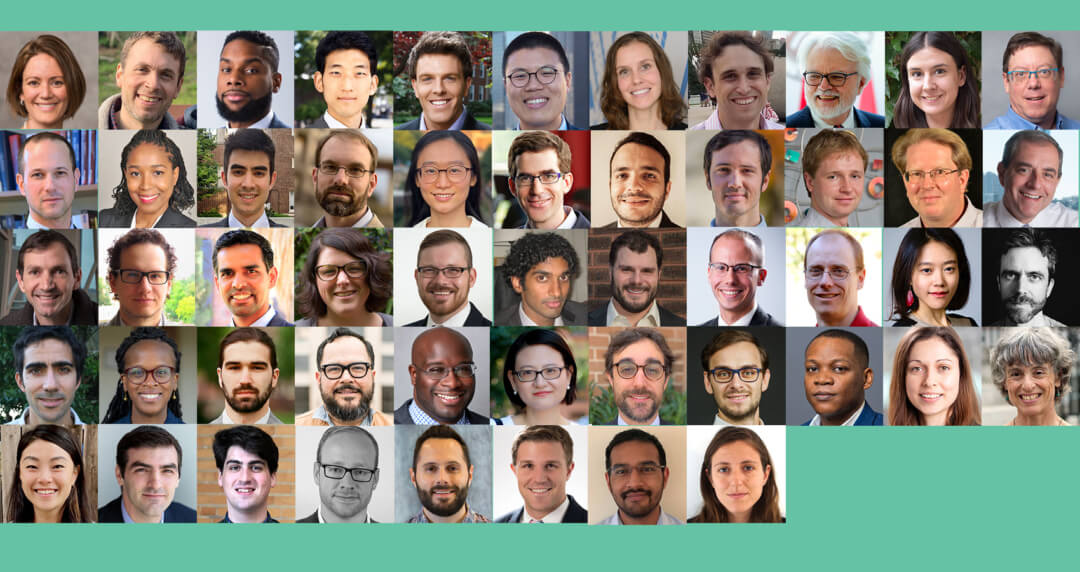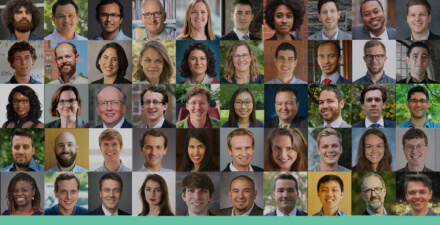Equitable Growth announces record $1.07 million in research grants on inequality and broadly shared growth

The Washington Center for Equitable Growth today announced research grants totaling $1,074,060—our largest year to date—to seek evidence on important issues related to the intersections between economic inequality and growth. The 46 economists and other social scientists who will participate in this funded research consist of faculty, postdoctoral scholars, and Ph.D. candidates at leading U.S. colleges and universities, as well as some scholars from government research agencies.
This is the organization’s seventh academic grantmaking cycle. As in the past, the successful applicants responding to the 2020 Request for Proposals were selected in a competitive process, with rigorous vetting by outside academics and approval by the Equitable Growth Steering Committee.
Equitable Growth funds research in four categories: human capital and well-being, the labor market, macroeconomic policy, and market structure. In this new round of grants, the organization placed a particular emphasis, sometimes across categories, on racial and ethnic elements of inequality, economic mobility, the impact of domestic outsourcing, market concentration, and climate and the environment. The Bill & Melinda Gates Foundation provided generous financial support for research investigating economic mobility, and the Alfred P. Sloan Foundation provided generous financial support for projects exploring the impact of domestic outsourcing on workers.
Equitable Growth has always had a focus on the racial and ethnic elements of inequality in the United States, and the events of 2020 have led the organization to commit to an even greater emphasis on racial inequality and justice, including a redoubling of efforts to strengthen the pipeline of early-career Black scholars and other scholars of color. A number of this year’s grants reflect these priorities.
“For too long,” said Equitable Growth President and CEO Heather Boushey, “the field of economics has ignored the intersection of race and power in research agendas. That must change. At Equitable Growth, we commit to doing our part by funding more research based on the lived experience and legacy of structural racism.”
One grant is especially timely, given the unequal impact of the coronavirus and the accompanying recession. A study by Andria Smythe of Howard University will advance understanding of the impact of recessions on future employment and earnings by studying the long-term effects of the 1980 recession on young workers from that period, with a focus on workers of color who resided in regions where the recession was deepest.
The staggering differences between Black and White household wealth are well known, as is the large percentage of households with insufficient savings to cover unexpected expenses, but there is little research on how month-to-month fluctuations in income affect actual consumption and how that varies by race and wealth. Peter Ganong, Pascal Noel, and Damon Jones of the University of Chicago will use a new dataset to explore this question, which has important implications for macroeconomics and policies to address income security and economic inequality.
Jamein Cunningham and Jose Joaquín Lopez of the University of Memphis will fill a gap in research on labor market discrimination by studying the degree to which the private enforcement of anti-discrimination legislation through lawsuits in the federal courts has influenced racial gaps in earnings and other socioeconomic outcomes. They will examine how these civil actions influence labor market outcomes and intergenerational mobility of Black Americans.
Three grants to Ph.D. candidates will also explore issues of racial equity. Michele Cadigan of the University of Washington will explore how the legalization of recreational cannabis integrated criminal justice and racial economic equity initiatives. Lena Song of New York University will carry out a historical analysis of whether racial discrimination by firms led to underprovision of content for minorities in the U.S. radio market in the post-war Jim Crow era and whether competition in the market reduced the racial divide. And Janet Xu of Princeton University will explore the consequences of diversity programs on recipients’ individual-level labor market outcomes.
Another grant, to a professor at the University of California, Los Angeles, focuses on racial inequality issues related to climate change, one of two grants that reflect Equitable Growth’s inclusion in its request for proposals, for the first time, of issues relating to climate and the environment. Robert Jisung Park will examine the growing evidence that for those whose work regularly exposes them to the elements, such as construction workers, temperature stress resulting from climate change may be affecting cognitive performance, how much work an individual can perform, and workplace safety, all of which could reduce earnings and job quality for many workers. The study will question whether or not climate change is exacerbating economic inequality and how that effect could be mitigated.
The other faculty grant focused on environmental concerns was awarded to Spencer Banzhaf of Georgia State University and Randall Walsh of the University of Pittsburgh. They will advance research on environmental inequity and the disparate impact of pollution on different income groups. The researchers will investigate the relationships between pollution and race, income, and human capital in Pittsburgh over the period of 1910 to 2010. They will look at inequality in exposure to pollution and the effects of childhood exposure on adult income.
One grant to a Ph.D. candidate will explore the intersection of climate policy and economic inequality. Eva Lyubich of the University of California, Berkeley will investigate whether people have constrained choices in energy consumption due to where they live, and if that, in turn, may mean that traditional models of the efficiency of carbon taxation are incorrect.
Intergenerational mobility is the primary focus of the organization’s grants in the category of human capital and well-being in this grant cycle. As Equitable Growth Steering Committee member Janet Currie noted:
There’s a growing body of evidence that investments in early childhood have outsized returns later in life. But there’s still a lot we don’t understand about the mechanisms at play, especially the intersections between place, families’ socioeconomic status, race, and—more urgent than ever—the effects of pollution and climate change.
The new research grants addressing intergenerational mobility include the Smythe and Banzhaf-Walsh studies above, as well as the following three grants.
Fenaba Addo and Cliff Robb of the University of Wisconsin-Madison will study the impact of debt-free student aid, in the form of Promise Tuition grants, on the finances and degree attainment of low-income students who transfer to 4-year colleges from community colleges. Research has shown that college is important to upward economic mobility, but the cost of college can be a significant barrier to gaining admission and completing college. In addition to improving understanding of how Promise Tuition grants can best be structured, a goal of this study is to inform policy debates over college affordability and completion, as well as the question of whether postsecondary education in the United States is supporting or inhibiting intergenerational mobility.
While there is increasing understanding of trends in intergenerational mobility in the latter part of the 20th century, far less is known about mobility in the early part of the century. Martha Bailey of the University of California, Los Angeles and Paul Mohnen and Shariq Mohammed of the University of Michigan will produce a massive new database of mobility rates going back to 1900. The work will provide a far more comprehensive picture of changes in intergenerational mobility over time, supporting the work of many other researchers.
Another University of Michigan researcher, Fabian Pfeffer, also will develop a significant new database that will permit him to overcome the limitations of existing data to enhance understanding of wealth inequality. This will allow Pfeffer to answer pressing questions, such as how concentrated wealth is locally and the degree to which wealth distribution remains constant across generations.
Two grants to Ph.D. candidates will look at other aspects of human capital and well-being. Derek Wu of the University of Chicago will examine the short- and long-run impacts of being suddenly removed from critical government programs such as Medicaid. And Geoffrey Schnorr of the University of California, Davis will study how income volatility experienced by low-income workers affects the amount of Unemployment Insurance they receive.
An important contributor to the stubbornness of wages and the deterioration of conditions for workers before the coronavirus recession, despite the tight labor market, was domestic outsourcing, the shifting by large firms of the acquisition of many goods and services from in-house sources to a complex web of other companies, where bargaining power for workers was weaker.
“Over the past several decades, the labor market has seen major shifts in how work is organized, and not just through the rise of gig work, but by firms contracting for everything from janitorial services to human resources,” said Equitable Growth Steering Committee member Karen Dynan. “It’s imperative that policymakers understand the effects on workers, especially their wages, access to benefits, and opportunities for advancement.”
Four new Equitable Growth grants in the labor market category were awarded to researchers studying the impact of domestic outsourcing.
Johannes Schmieder of Boston University will be joined by James Spletzer and Lee Tucker of the U.S. Census Bureau’s Center for Economic Studies and David Dorn of the University of Zurich in examining the extent to which domestic outsourcing has contributed to earnings inequality in the United States. Using a methodology Schmieder first deployed to study the same issue in Germany, the researchers will connect two datasets that will enable them to see the impact of moving jobs to outsourced establishments such as call centers, janitorial service companies, and security services.
If you see an Amazon.com Inc. delivery van dropping off packages in your neighborhood, you will be looking at the subject of a study by Steve Viscelli of the University of Pennsylvania, who will examine the impact on workers of recent changes in “last-mile delivery.” Viscelli will interview Amazon delivery workers to discover how workers experience new technological and outsourcing practices in three categories—communication and monitoring, algorithmic planning and management, and the surveillance of delivery by customers—that are used to manage workers.
Siwei Cheng and Michael Hout of New York University will use a massive collection of job posting and resume data to study, in great detail, economywide trends in tasks and occupations to detect changes in how work is organized. The project will examine variations within occupational categories and connections across categories; use resume data to examine worker mobility; and investigate elements of job quality, such as nonwage benefits and employment relations, including the incidence of nonstandard work such as temporary, on-call, and contract-based employment.
David Autor of the Massachusetts Institute of Technology, Anna Salomons of the Utrecht School of Economics, and Bryan Seegmiller, also of MIT, will construct a database showing the creation of new types of jobs from 1900 to 2020. Previous research has compiled such data going back only to 1964. The authors aim to chart the evolution of new work over 12 decades, assess the potentially varying importance of new work in job creation and demands for certain skills over time, and test a set of economic hypotheses about where and when new work arises. The project can provide insight into changes in how new jobs are created, including the role of technology.
Markets and competition are a policy focus for Equitable Growth, and in this round of grantmaking, the organization is funding three market structure projects by industrial organization economists.
Prospective merger review—the examination of intended corporate mergers by government agencies to determine whether and under what circumstances they should be permitted—constitutes a large share of antitrust enforcement expenditures, yet there has been little research on its effectiveness. With the help of an Equitable Growth grant, Thomas Wollman of the University of Chicago, José Ignacio Cuesta of Stanford University, and Federico Huneeus of Yale University will use the introduction of prospective merger review in Chile in 2016 to estimate the impact of this procedure on antitrust enforcement actions, product prices, input prices, output, investment, and corporate research and development.
Vivek Bhattacharya and Gaston Illanes of Northwestern University will study the accuracy of the standard simulation techniques federal agencies use to predict the impact of prospective corporate mergers on prices. Such simulations help regulators decide whether a merger is likely to be anticompetitive, but little work has been done to determine their accuracy. The study will help determine whether predicted outcomes align with actual outcomes and if not, what the sources are of the prediction error, helping enforcement agencies assess whether their methods for judging mergers are sufficient.
The third project on market concentration funded by Equitable Growth is a study of the cement industry by Nathan Miller of Georgetown University. Miller will examine how the structure of the industry has been altered by technological change since the 1970s, why the share of income going to owners’ profits has risen while that going to workers’ wages has declined, and what role federal antitrust enforcement or merger review could have played in addressing these issues.
Three new Equitable Growth grants in the area of macroeconomic policy focus on the impact of wealth inequality on macroeconomic growth and the distributional effects of monetary and fiscal policy. In addition to the Ganong and others grant described above, new grants in this category are as follows.
Greg Kaplan of the University of Chicago will examine mark-ups, labor market inequality, and the distributional implications of monetary policy as part of a broader effort to develop a new macroeconomic model that incorporates realistic dynamics in the distribution of labor income in response to macroeconomic shocks. This is critical for understanding the impact of policies on economic inequality. Current macroeconomic models fail to capture the full dimensions of inequality because they do not adequately measure changes in the distribution of worker earnings.
Martina Jasova of Columbia University and Dominik Supera of the University of Pennsylvania will study whether and how monetary policy contributes to economic inequality. Specifically, their work will estimate the effects of monetary policy on the distribution of labor income and the differential effects of credit transmission in the economy.
Jacob Robbins of the University of Illinois at Chicago, a former Equitable Growth dissertation scholar, will construct a new dataset from previously unavailable IRS data to measure capital gains as a means of more accurately detailing the distribution of wealth in the United States. This will allow for more accurate estimates of wealth inequality, including more precise estimates for those at the top of the wealth distribution.
Two grants to Ph.D. candidates also focus on the macroeconomy. Lina Yu of Georgetown University will look at how U.S. monetary policy affects firms’ employment differently, depending on the age and size of the firm. And Pedro Juarros and Daniel Valderrama, also Ph.D. candidates at Georgetown, will focus on place-based policies and how geographic concentration of innovation affects regional economic growth in the United States.
New grants in the area of the labor market include not only the studies focused on domestic outsourcing described above, but also several other grants.
Ruth Milkman and Luke Elliott-Negri of the City University of New York and Suresh Naidu and Adam Reich of Columbia University will examine collective labor action in platform businesses. They will conduct two surveys, one to compare the attitudes of various kinds of food workers, including those at meat processing facilities, grocery stores, restaurants, and platform-based food delivery services, and a second, nationally representative sample to assess changing food consumption habits, as well as perceptions of food workers and collective action during the current pandemic. The surveys will assess the role customers might play as a source of power for workers who strike or protest working conditions, as well as the effects of different aspects of job quality on propensity to leave a current job.
Several Ph.D. candidates will also investigate inequality in the labor market. Joanna Venator of the University of Wisconsin-Madison will examine how Unemployment Insurance policies interact with job search behavior in dual-earner households and the impacts on the gender wealth gap, women’s labor force participation, and geographic mobility. Benjamin Scuderi of the University of California, Berkeley will explore the problem of implementing federal tax policy aimed at encouraging work when there is imperfect competition in U.S. labor markets. Glen Kwende of American University will estimate U.S. workers’ bargaining power over time to better understand how labor market dynamics impact wage determination. And Jonathan Garita of the University of Texas at Austin will analyze how the labor market absorbs an increase in the minimum wage by studying the case of Costa Rica, which has multiple wage floors based on workers’ skill level.
Equitable Growth’s academic program is a year-round process. The staff and Steering Committee have already begun work on the 2021 Request for Proposals. And, as always, we will be publishing new research by our grantees, making sure policymakers and the public see the results, and continuing to build a bridge between policymakers and scholars who can provide the evidence they need to develop policies that support an economy that works for all.





